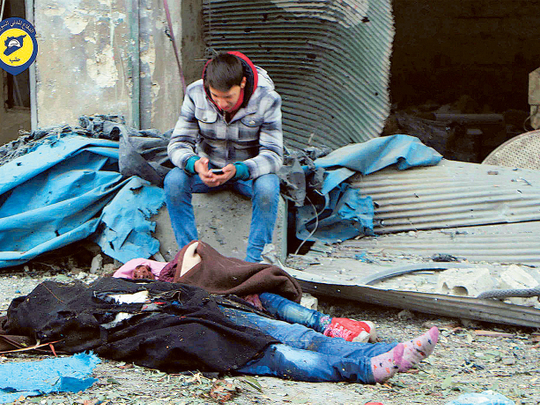
Washington: The fall of the last rebel-held areas in the Syrian city of Aleppo could seal the fate of the “Obama Doctrine”, deepening the world’s worst humanitarian crisis in decades and staining US President Barack Obama’s legacy.
An impending rebel loss underscores the failure of US efforts to stem the carnage from Syria’s nearly six-year-old civil war, leading some critics to predict that Obama’s record will be tarnished just as President Bill Clinton’s was by his refusal to intervene to halt the 1994 Rwandan genocide.
Refugees of the Hutu tribe return to Rwanda from Zaire in 1996. Members of the Hutu tribe had been hiding in Zaire to escape the genocide of 1994. Clinton’s refusal to intervene in Rwanda allowed the genocide. Reuters
“There is no doubt he will be hammered in historical terms,” said Aaron David Miller, a former Middle East adviser to Republican and Democratic administrations. “The question will be why he didn’t do more.”
Syria’s war, which many have described as the worst humanitarian situation since World War II, has been one of the main testing grounds for Obama’s doctrine of relying on local proxy fighters instead of large-scale US military deployments, reflecting his reluctance to be drawn back into unpopular ground conflicts like the Iraq war.
“Leading from behind leaves a vacuum that is filled by the Bashar Al Assads and Vladimir Putins of the world,” said Senate Armed Services Committee Chairman John McCain.
“I think history will judge that these are unintended results that are going to cause great challenges to the United States for years to come.”
Obama has been criticised for refusing to provide sufficient arms and other support to moderate rebel groups to compel Al Assad and his Russian and Iranian backers to negotiate an end to his authoritarian rule.
“Obama has pursued a policy of calculated dithering in Syria, just agonising over the choices until they no longer existed,” said Emile Hokayem, a senior fellow at the International Institute for Strategic Studies think tank.
The Democratic president has defended his policy as “judicious.” His spokesman, Josh Earnest, said it was Obama’s “overriding responsibility” to protect the interests and safety of the American people first.
Obama first called on Al Assad to leave power in 2011. But he never supplied moderate rebels with enough firepower to topple him or force him to the negotiating table. His failure to carry out threatened air strikes to enforce his 2012 “red line” over Al Assad’s use of banned chemical weapons dealt a heavy blow to US standing, including by some of his staunchest regional allies.
Obama also rejected recommendations, as recently as October, by members of his national security team for tougher action against Al Assad. Obama recently told an interviewer that the grim situation in Syria “haunts me constantly” — although he insisted there was not much he would have done differently.
James Jeffrey, a former US ambassador to Iraq and Turkey, said Obama’s risk-averse approach had not only allowed Al Assad to attack the opposition with impunity but also opened the door to greater Russian and Iranian influence in the Middle East.
Robert Ford, who resigned in 2014 as US ambassador to Syria over policy disagreements, and is now at the Middle East Institute, said: “I’m personally sad that after we thought we had learnt lessons in places like Sarajevo, Srebrenica and Rwanda, it’s in fact very clear that this administration doesn’t really care.”












